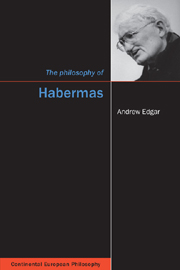5 - The theory of communicative action
Summary
Universal pragmatics
Introduction
Habermas's work between 1973 and 1983 may be seen to be primarily concerned to work out the implications of Legitimation Crisis. This entails the development of a theoretical reconstruction of the competences that people use in everyday communication: universal pragmatics. This takes its final form in the magisterial The Theory of Communicative Action. At the same time he is working out the ethical theory that is outlined in the final part of Legitimation Crisis. (A collection of essays on this theme was published in 1983.) As is perhaps unsurprising given the direct link between universal pragmatics and The Theory of Communicative Action, characterized as it is with a synoptic engagement with the grand traditions of sociology, Habermas approaches universal pragmatics as a comprehensive social theory. At one level this is a continuation of his exploration of the tensions between instrumental and hermeneutic practice that had concerned him in the 1960s. While he makes a distinction between non-social instrumental action (which is to say, instrumental work on the natural world) and “social action”, he further divides social action into “strategic action” and “communicative action”. Strategic action is orientated to success, which is to say that the agent takes an objectifying attitude to the social world, and thus seeks to manipulate social “objects”. In constrast, communicative action is orientated to mutual understanding. The agent treats others as subjects with whom one establishes meaningful intersubjective relations (ARC: 263; CES: 209).
- Type
- Chapter
- Information
- The Philosophy of Habermas , pp. 138 - 187Publisher: Acumen PublishingPrint publication year: 2005



